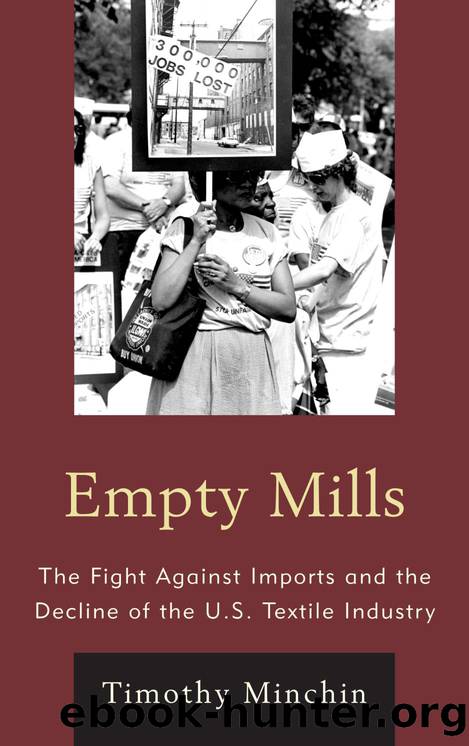Empty Mills by Minchin Timothy J.;

Author:Minchin, Timothy J.;
Language: eng
Format: epub
Tags: undefined
Publisher: Rowman & Littlefield Publishers
Published: 2012-08-15T00:00:00+00:00
âTextile workers from across the country mobilizing in support of the Crafted With Pride in the USA campaign, ca. mid-1980s.â (Photo courtesy of the South Carolina Political Collections, University of South Carolina)
Significantly, considerable financial support for the Council came from Wal-Mart, and this helped the program to get off the ground. At the ACTWUâs General Executive Board meeting on July 29, 1985, President Murray Finley read out a letter of support for the âBuy American Campaignâ from Sam Walton, Wal-Martâs founder. In it, Walton declared that âproducts âCrafted with Pride in the USAâ can be competitive with products anywhere in the world.â Praising manufacturers as âthe entrepreneurs that fuel our economy,â Walton saw the campaign as a way of reducing the trade deficit. Overall, the powerful CEO pledged that âour entire management and merchandising staff is committed to this âBuy Americanâ program.â[27] Backing up his words, in 1985 Walton cut imports by 20 percent and purchased $197.3 million of merchandise from domestic suppliers. At a retailing convention, he even âwaved a flannel shirt in the air like an evangelist pounding his Bible at a tent revival meetingâ as he sought converts to the Buy American initiative.[28]
Understandably pleased, Council supporters held up Walton as a role model. In September 1985, the American Association of Apparel Manufacturers and the Council sponsored a dinner in honor of the Arkansan. At the gathering, Walton was praised for his efforts to replace items âthat once had been importedâ with American-made goods. In 1985, Burlington Industries gave Wal-Mart its âGolden Scissors Awardâ in recognition of its âoutstanding merchandising effortsâ on behalf of American mills, while the leaders of the Georgia Textile Manufacturers Association also wrote Walton to express their âvery deep gratitudeâ for his support.[29]
Wal-Mart used the publicity to cement its image as a patriotic retailer who cared about American workers. In 1988, for example, Wal-Mart vice president Nick White told a gathering of textile executives that 75 percent of the goods stocked by his company were American made. Pitching his firm as a role model, White declared that Wal-Mart would source all of its products domestically if they were competitive in price and quality. It was a big âif,â and it was clear that Wal-Mart was actually supporting the campaign on its terms. This meant that if domestic products were more expensive than imports, they would not be purchased. White himself explained that 119 American textile companies had recently bid for Wal-Mart contracts, but seventy had been ruled out on price grounds. Ingeniously, however, White insisted that it was mill owners who were not âreceptive to the Buy America campaign.â In the early 1990s, the huge retailer got even tougher and started to demand annual price cuts from suppliers if they wanted to keep their contracts. Consumers, however, still saw Wal-Mart as patriotic. In one national survey in 1992, 60 percent of respondents declared that they were aware of Wal-Martâs dedication to domestic sourcing, while 71 percent reported that they consequently shopped more often in the companyâs stores.
Download
This site does not store any files on its server. We only index and link to content provided by other sites. Please contact the content providers to delete copyright contents if any and email us, we'll remove relevant links or contents immediately.
Life 3.0: Being Human in the Age of Artificial Intelligence by Tegmark Max(5193)
The Sports Rules Book by Human Kinetics(4079)
The Age of Surveillance Capitalism by Shoshana Zuboff(3990)
ACT Math For Dummies by Zegarelli Mark(3855)
Blood, Sweat, and Pixels by Jason Schreier(3498)
Unlabel: Selling You Without Selling Out by Marc Ecko(3473)
Hidden Persuasion: 33 psychological influence techniques in advertising by Marc Andrews & Matthijs van Leeuwen & Rick van Baaren(3293)
Urban Outlaw by Magnus Walker(3245)
The Pixar Touch by David A. Price(3215)
Bad Pharma by Ben Goldacre(3101)
Project Animal Farm: An Accidental Journey into the Secret World of Farming and the Truth About Our Food by Sonia Faruqi(3019)
Brotopia by Emily Chang(2898)
Kitchen confidential by Anthony Bourdain(2834)
Slugfest by Reed Tucker(2805)
The Content Trap by Bharat Anand(2779)
The Airbnb Story by Leigh Gallagher(2704)
Coffee for One by KJ Fallon(2423)
Smuggler's Cove: Exotic Cocktails, Rum, and the Cult of Tiki by Martin Cate & Rebecca Cate(2340)
Beer is proof God loves us by Charles W. Bamforth(2252)
